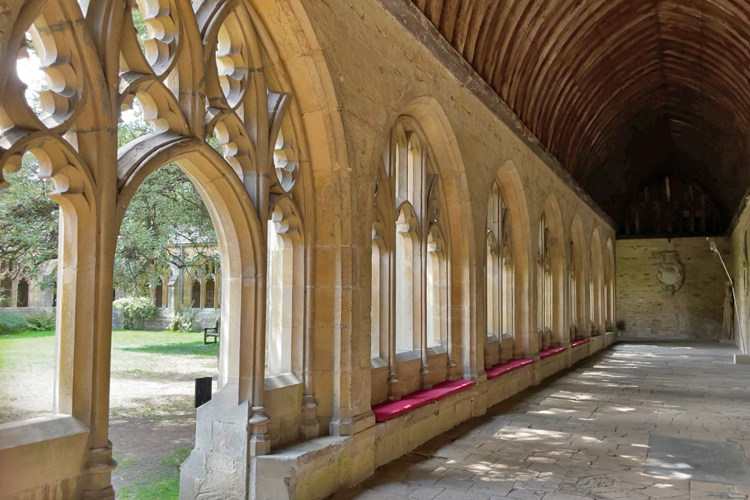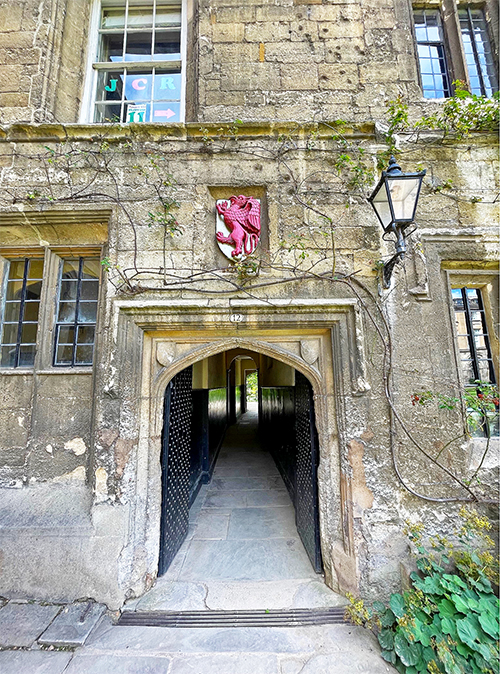Original story posted on A&S news, as well as pasted below.
A group of students sat outside this summer and chatted about the works of Jane Austen. So what made this conversation so special?
The lively discussion took place in the scenic English countryside where many of Austen’s novels were set.
This was just one of the memorable experiences enjoyed by 29 students who recently returned from a four-week course in Oxford titled, Jane Austen & Her Contemporaries — part of U of T’s Summer Abroad program.
Taught and organized by Alex Hernandez, an associate professor in the Faculty of Arts & Science’s Department of English, the course featured four of Austen’s novels — Northanger Abbey (1817), Pride and Prejudice (1813), Mansfield Park (1814), and Persuasion (1817).

“We were really in the footsteps of Austen, in the footsteps of her characters,” says Hernandez. “The literature was crossing over into our reality, so it's been an amazing and enriching experience.”
In addition to diving into each story, the class discussions extended to world events, related literature as well as the political, arts and philosophical landscape of the time.
Our class discussions were profound and thought-provoking. Examining Austen in both her historical context and her relevance to modern life was truly inspiring.
“Austen’s stories are about people in rural towns, but they’re about so much more,” says Hernandez. “You see how she is in the middle of many of the core debates of her period.”
The students stayed at dorms at Worcester College, part of Oxford University, where they took part in three-hour lectures.
“Our class discussions were profound and thought-provoking,” says Ellie Twohey, a third-year student pursuing a major in ethics, society & law as a member of Trinity College. “Examining Austen in both her historical context and her relevance to modern life was truly inspiring.”
And the learning didn’t stop there.

“We spilled out onto picnic benches after class and continued the conversation,” says Hernandez. “We just kept talking about what the students were processing. I could see their minds working and pushing themselves.”
Each week included an excursion directly connected to key moments in Austen’s texts.
“During our field trips, it often felt like we were stepping right into the pages of Austen's novels, immersing ourselves in the environments that inspired her and walking in her heroines' shoes,” says Twohey.
In the first week, the class explored Northanger Abbey, which follows the life of its young heroine, Catherine Morland, a naive young woman away from her family for the first time and trying to navigate the world as well as her own emotions.
The class delved into discussions about the novel, touching on its connections to the French Revolution and the violent decade that followed. The class also explored the element of gothic — a key theme in the novel — examining gothic literature in Austen’s day.
The end of the week saw the students taking an excursion to Bath, where Northanger Abbey is set. During Austen’s time, Bath was a popular vacation spot where families visited the Roman Baths.
For Twohey, arriving in Bath was surreal.
Stepping off the bus into the city was a beautiful moment. We received a history lesson at the Roman Baths and hiked up Beechen Cliff for a priceless view of the entire city.
“Stepping off the bus into the city was a beautiful moment,” she says. “We received a history lesson at the Roman Baths and hiked up Beechen Cliff for a priceless view of the entire city.”
The second week the class dove into Pride & Prejudice, which follows the turbulent relationship between Elizabeth Bennet, the daughter of a country gentleman, and Fitzwilliam Darcy, a rich aristocratic landowner. They must overcome the sins of pride and prejudice in order to fall in love.
“It’s about marriage, and about women growing up and then negotiating what's expected of them, versus a fulfilling life

domestically,” says Hernandez.
Through this novel, Hernandez led discussions about Romantic-era feminism, as well as the role of “the picturesque,” referring to the importance of natural landscapes in Austen’s writing. That week concluded with a field trip to Stourhead Estate.
“Many of my students were quite jazzed about this because it’s where they filmed Pride and Prejudice,” says Hernandez.
For Tiana Milacic, a third-year English student and a member of Victoria College, touring Stourhead Estate brought Austen’s work to life in a dramatic way.
“This excursion was the most memorable experience I had during this course,” says Milacic. “After getting a tour of the estate, our class headed over to the vast gardens for a picnic. We sat on a hill and discussed the picturesque in relation to Austen's work, followed by a discussion of just life in general.
“Before the course started, I was particularly interested in discussing the picturesque in relation to Austen's work. I had encountered the concept in previous courses and was fascinated by it. So going to Stourhead Estate and being able to conceptualize the picturesque in real-time fulfilled this academic interest.”
The third week, students read Mansfield Park that tells the story of young Fanny Price, who is sent to live with her wealthy relatives, the Bertrams, at the age of ten. As she grows up, she develops feelings for her cousin Edmund Bertram, the only person at Mansfield Park who shows her true kindness.

“In Mansfield Park we make a shift to weightier subjects, we talk about empire, about colonialism, about slavery,” says Hernandez. “We try to think about what that's doing in her novel. We also read the work of abolitionists and abolitionist poetry.”
The excursion for this week brought the class back to London where they enjoyed a “Slavery in the City” tour to better understand the city’s history of the slave trade. And as Austen made frequent references to Shakespeare in her novels, it was only fitting that the students attend a performance of As You Like It in London’s famous Globe Theatre.
The final novel, Persuasion, is a satirical romance that follows the love story of Anne Elliot and Frederick Wentworth. After Anne is persuaded by her family and Lady Russell to reject Wentworth, Anne loses her youthful happiness. When Captain Wentworth comes back into her life, Anne starts to regain her youth.
“When we get to Persuasion, we talked about the Napoleonic wars and thought more generally about historical novels and tried to put that in context with some critical theorists,” says Hernandez.
The memories I've created on this trip will stay with me forever, and the people I've met made my experience truly special. I'm immensely grateful for this experience and wholeheartedly recommend it to anyone interested in attending.
The last excursion gave the students the chance to wander around the British Library, one of the two largest libraries in the world with between 170 and 200 million items from around the world.
“The memories I've created on this trip will stay with me forever, and the people I've met made my experience truly special,” says Twohey. “I'm immensely grateful for this experience and wholeheartedly recommend it to anyone interested in attending.”


